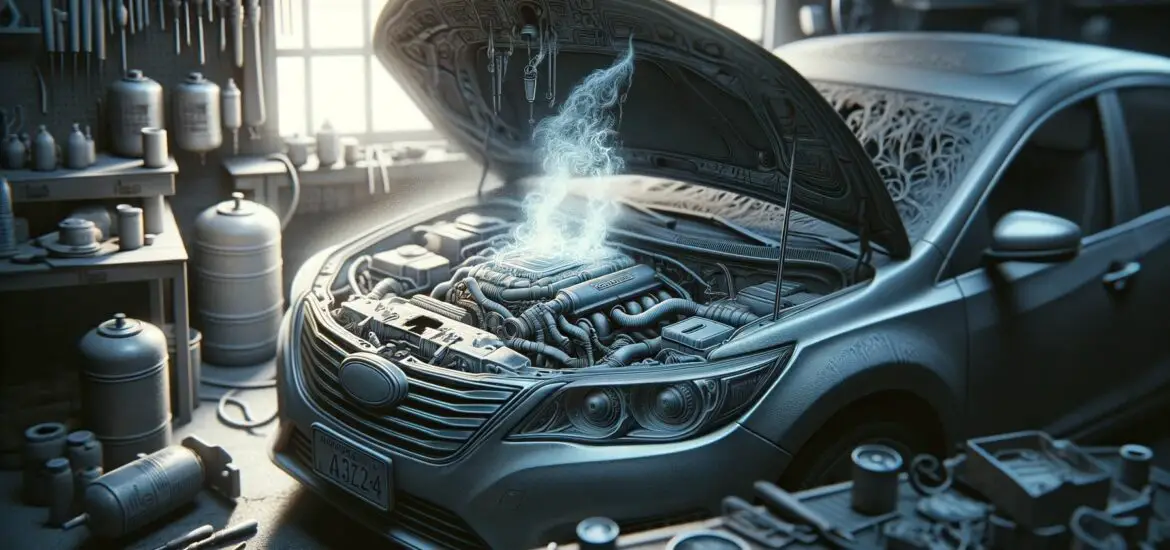This comprehensive guide is designed to walk you through each step of identifying, diagnosing, and repairing freon leak from car.

Table of Contents
Identifying Freon Leak from Car
Identifying freon leak from car is crucial for maintaining your car’s air conditioning system’s efficiency. Signs of a freon leak include a noticeable decrease in the cooling power of your AC system.
If the air from your AC feels warmer than usual, or if it takes longer to cool the cabin, these could indicate a freon shortage due to a leak. Another sign is a hissing or bubbling sound, which is the sound of gas escaping from a small hole or crack in the AC system.
In addition, a greasy film or oily residue on AC components, such as the compressor, hoses, or connectors, often points to a leak. This residue is left behind by the escaping refrigerant mixed with the lubricant in the system.
Tools Required
Addressing a freon leak requires specific tools. A refrigerant leak detector is essential for locating leaks. This handheld device senses refrigerant gas in the air, beeping or flashing to indicate the presence of freon.
You can get this Elitech WJL-6000S Freon Leak Detector from Walmart.
UV dye and UV light are used for visual inspection. When added to the AC system, the dye escapes through the leak and becomes visible under UV light. Basic hand tools like wrenches and screwdrivers are needed to access and repair the AC components.
Safety equipment is also critical. Safety goggles protect your eyes from accidental refrigerant splashes, while gloves prevent skin contact with refrigerant, which can cause frostbite or chemical burns.
Safety Precautions
Handling refrigerants like freon requires caution. Freon can cause skin and eye irritation, and its fumes can be harmful if inhaled. Work in a well-ventilated area to minimize inhalation risks.
Always wear safety goggles and gloves for protection. If you come into direct contact with freon, wash the affected area with cold water and seek medical attention if necessary.
Be aware of the environmental regulations regarding freon handling in your area. In many places, it’s illegal to release freon into the atmosphere, and only certified professionals are allowed to handle it. If in doubt, consult a professional mechanic.
Repairing Freon Leak from Car
Once you’ve located the leak, the next step is to repair it. The repair process depends on where the leak is. If it’s in a hose or connector, replacing the faulty component is usually the solution. Sometimes, the leak can be in the compressor or the evaporator, which are more complex to replace and may require professional assistance.
After repairing or replacing the faulty part, you must evacuate and recharge the AC system. This involves removing any air and moisture from the system with a vacuum pump. Then you refill it with the correct amount of refrigerant. Using the type of freon specified for your vehicle is important, as using the wrong type can damage the system.
Preventing Future Freon Leak from Car
Preventive maintenance is key to avoiding future freon leaks. Regularly check your AC system for signs of wear and tear.
Replace the AC filter as recommended by your vehicle’s manufacturer, and keep an eye on the hoses and connectors for any signs of damage or corrosion. Ensure the system is clean, as dirt and debris can cause blockages and put extra strain on the system, leading to leaks.
Have a professional mechanic inspect your AC system at least once a year. They can perform a more thorough check and address any potential issues before they lead to a freon leak.
By taking these preventive measures, you can extend the life of your AC system and avoid the inconvenience and cost of frequent repairs.